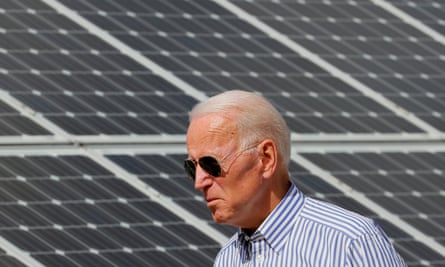Extract from The Guardian
Democrats’ policy to commit to net zero by 2050 united party and was a critical message for Australia, opposition climate change minister says

Last modified on Mon 9 Nov 2020 03.31 AEDT
Mark Butler has declared Joe Biden’s victory shows an ambitious climate policy can help Labor win elections rather than cost the party power, provided colleagues and activists mount the case for action rather than warring among themselves.
With Labor roiling since the 2019 election defeat about whether to wind back the level of ambition on climate action, the opposition’s climate change spokesman told Guardian Australia the US presidential election result demonstrated why it was important for Labor to stay the course and prosecute the policy arguments with “unity and consistency”.
“This shows that a strong, courageous policy on climate action and jobs can be a central part of a winning election formula in an economy very similar to ours,” Butler said. “The result also spoke to me about the importance of unity and consistency. Once a platform for climate action was finalised everyone rowed in the same direction – everyone who counted.”
Butler and the shadow resources minister, Joel Fitzgibbon, have been arguing for months about emissions reduction targets and support for traditional industries, and Fitzgibbon has threatened to quit the shadow cabinet if Labor adopts a medium-term target he opposes. But Butler on Monday noted that the Democrats and the environment movement had managed to rally around key propositions.
The Biden-Harris policy platform, which includes the United States rejoining the Paris climate treaty and committing to reduce emissions by net zero by 2050, “united the party from Joe Biden to Bernie Sanders to Alexandria Ocasio-Cortez to John Kerry – all of the elements of the party – and critically Sunrise and the other environment organisations”.
“Sure there are elements of the policy [some Democrats and environmentalists] would prefer were different, but they all fought for the same platform,” Butler said.
“That was critical and that’s a critical message for Australia. The case must be argued strongly and consistently across the whole country and Joe Biden did that in every part of the country, including Pennsylvania, where there is a lot of oil and gas, where it was said the level of ambition would cost him.”
While the incoming president will probably be preoccupied with significant domestic challenges, Biden’s victory will increase diplomatic pressure on Scott Morrison to step up Australia’s climate commitments.
When Biden is inaugurated in January, every member of the G7 and the European Union will be committed to net zero emissions by 2050. But Morrison has thus far resisted signing up to that commitment.
When net zero was raised by the British prime minister, Boris Johnson, during a conversation in late October, Morrison declared Australia’s targets would not be set by London or by Europe – a rhetorical point about sovereignty because only Australia can set its own targets.
Asked on Sunday how the shift in American policy would influence Australia, Morrison said Australia’s commitment to addressing climate change would continue, and “we have a strong story to tell about our achievement when it comes to commitments on the global stage”.
Morrison said he anticipated “a very positive discussion about partnerships we can have with the United States” about pursuing low emissions technologies. He said it was important to achieve not only a low emissions future “but a stronger economy as well, where we don’t say goodbye to jobs we don’t have to say goodbye to”.
The prime minister has left open the option of eventually adopting the mid-century target and some in the Liberal party want to consign the climate wars to history. But Morrison would face a backlash from the National party and some right wingers in his party room if he embraced the mid-century pledge.
The internal rumbling began on Sunday with former Nationals frontbencher Matt Canavan querying why Australia would go down that path.
The independent MP Zali Steggall is due to present to parliament on Monday long-promised climate change legislation that would include a target of net zero by 2050 that could be ratcheted up in line with changing scientific evidence.
The private member’s bill, which was announced in February but delayed due to Covid-19, is supported by Steggall’s fellow crossbenchers Rebekah Sharkie, Helen Haines, Andrew Wilkie and the Greens, and has been backed by climate scientists, economists and some business leaders, including the Business Council of Australia’s Jennifer Westacott, who described it as “sensible”.
On Sunday, another major employer association, the Ai Group, expressed support for the Steggall proposal.
The Ai Group’s chief executive, Innes Willox, also said the government needed to use the opportunity of Biden’s election and net zero commitments by major trading partners to “reset climate policy”.
“This changing international landscape provides Australia with the renewed impetus to deliver a bipartisan, nationally agreed framework that would match our international partners, end the climate wars and give business a sound foundation to plan for the future,” Willox said.

No comments:
Post a Comment